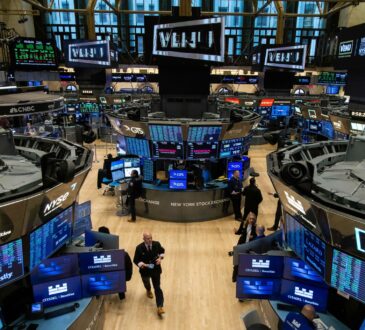
Americans woke up Monday morning to a stock market that was plummeting, further evidence that the country could be heading toward a recession.
The Nasdaq and the S&P 500 were each down 3% on the day, and the Dow lost 2.6%. The Nasdaq’s losses alone wiped out nearly $1 trillion of value in a single day of trading. Those losses are on top of a global meltdown in equities that began last week and intensified Monday.
Why did Japan’s stock market, as one example, on Monday record its worst day in 37 years? Analysts point to deepening concerns about the U.S. economy, where job growth is down and unemployment is up.
Remember, this is President Joe Biden and Vice President Kamala Harris’ economy. Like it? I don’t.
The market is complex and many factors influence it. Typically, no one reason can explain its ups and downs. This time, it looks like the dive was a response to the Federal Reserve’s decision not to cut interest rates last week and the weak job numbers released Friday.
But Americans can control a few things that influence the markets, including who leads the country during tough times.
Political implications of a fluctuating market

The markets are not a direct gauge of the nation’s economic health, but stock prices are a symptom and can affect political candidates’ popularity with voters. A plummeting market, and other signs that we may be heading into a recession, could bode poorly for the incumbent candidate, who is now Harris.
It’s not as if all was well in the economy before the stock markets started acting weird. About 62% of Americans see inflation as one of the biggest problems facing the nation, and 1 in 3 Americans are struggling financially after living in an inflated economy since the COVID-19 pandemic.
In 2008, in the middle of one of the worst economic downturns Americans had experienced in decades, Republican presidential nominee John McCain claimed, “The fundamentals of our economy are strong.”
Americans did not believe that to be true. It hurt McCain’s campaign and helped to propel Democratic nominee Barack Obama to victory.
As a Republican, I bashed Biden.But Harris’ far-left ideas scare me even more.
Whether it’s fair or not, many voters look at their own finances and their job security, then support the candidate they think can “fix” the economy.
It’s clear that person is not Biden or Harris. It may not be former President Donald Trump either, but the chances for a strong economy are better with a Republican at the helm.
Will Kamala Harris stabilize the markets?
Biden has touted a strong economy, with growing wages and more jobs. Some of that is true, but inflation has been so high over the course of his four-year term that his economic claims seem like Gaslighting 101.
Biden, despite his claims, has failed to turn the economy around for tens of millions of lower- and middle-income Americans. In fact, his policies have hurt them.
Bad-idea Biden strikes again.His rent control plan is a feeble attempt to buy votes.
By failing to rein in enormous budget deficits that added trillions of dollars to the national debt, Biden helped to create an environment where inflation remained high throughout most of his time in the White House. That has made everyday items much more expensive for consumers and kept interest rates high, which is a huge burden on anyone who buys a home or a vehicle.
Harris has now inherited Biden’s economy and the voters’ financial pain that comes with it.
Biden and Harris’ policies raise the most important question a voter in an unstable economy can ask: Who can I trust to lead the economy in a downturn?
If a recession is coming, who do voters want in charge?
A fundamental difference between Republicans and Democrats involves how they view the free market. Democrats tend to tax more, regulate more and manipulate the market through government spending and policies. Biden has followed that pattern, and Harris sounds no different.
Republicans tend to want to deregulate, cut taxes and allow supply and demand to influence the market naturally.
Of course, Trump veered from this model when he pumped money into the economy in 2020, under the guise of pandemic stimulus funds. That sudden and enormous flow of government spending contributed to the spike in inflation. Trump’s proposed tariffs on imports also go against free-market principles and likely would trigger even more inflation.
A flaw both presidential nominees have − Harris and Trump − is that they have failed to quell government spending. The deficit is wildly high − now and under Trump − and there are no signs it will go down anytime soon. But Trump has vowed to cut taxes, which could help keep a faltering economy from tipping into recession.
Voters should look at the way Biden has handled economic policy the past four years, handing that responsibility to Harris, and ask themselves if they trust another Democratic administration to improve things.
I sure don’t.
Nicole Russell is an opinion columnist with USA TODAY. She lives in Texas with her four kids. Sign up for her newsletter, The Right Track, and get it delivered to your inbox.



